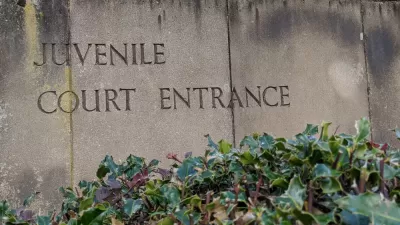Absurd as it may sound, minor children are sometimes named in eviction filings. If a child’s name makes in onto official court records—especially if those records are public and online—the damage can be irreversible.

*Linda’s children were too young to write their own names when they were entered as defendants into a New York state housing court computer. Both kids, now 3 and 7, are identified as legal parties in a pending eviction case against their mother.
Absurd as that may sound, it’s not a fluke. Minor children are sometimes named in eviction filings. When it happens, the damage is acute and difficult to repair even if it’s caught quickly. If a child’s name makes in onto official court records, especially if those records are public and online, the damage can be irreversible.
Almost a year ago, Linda’s landlord banged on her apartment door and quizzed her then-6-year-old, asking the child to spell both kids’ names. The landlord showed up unannounced while Linda was in the bathroom, and her older child opened the door before Linda could intervene.
“I was so upset and disturbed and angry,” she says. “This is an adult situation, why are the children involved? When I spoke with the landlord, he said his lawyer told him that to evict everyone from the premises, everyone’s name should be listed on the eviction notice.”
Attorneys familiar with the issue say kids are sometimes named in evictions to intentionally harass or intimidate tenants, though usually the landlords (or their attorneys) misunderstand the laws and/or have little regard for the long-term consequences evictions inflict on children and families.
In New York, children are being named in eviction fillings more often recently as an unintended consequence of the state’s Housing Security and Tenant Protection Act of 2019. A provision in the law uses language that can be misinterpreted to mean ...
FULL STORY: Minor Defendants: Kids Are Being Named in Evictions

Alabama: Trump Terminates Settlements for Black Communities Harmed By Raw Sewage
Trump deemed the landmark civil rights agreement “illegal DEI and environmental justice policy.”

Planetizen Federal Action Tracker
A weekly monitor of how Trump’s orders and actions are impacting planners and planning in America.

Why Should We Subsidize Public Transportation?
Many public transit agencies face financial stress due to rising costs, declining fare revenue, and declining subsidies. Transit advocates must provide a strong business case for increasing public transit funding.

Understanding Road Diets
An explainer from Momentum highlights the advantages of reducing vehicle lanes in favor of more bike, transit, and pedestrian infrastructure.

New California Law Regulates Warehouse Pollution
A new law tightens building and emissions regulations for large distribution warehouses to mitigate air pollution and traffic in surrounding communities.

Phoenix Announces Opening Date for Light Rail Extension
The South Central extension will connect South Phoenix to downtown and other major hubs starting on June 7.
Urban Design for Planners 1: Software Tools
This six-course series explores essential urban design concepts using open source software and equips planners with the tools they need to participate fully in the urban design process.
Planning for Universal Design
Learn the tools for implementing Universal Design in planning regulations.
Caltrans
Smith Gee Studio
Institute for Housing and Urban Development Studies (IHS)
City of Grandview
Harvard GSD Executive Education
Toledo-Lucas County Plan Commissions
Salt Lake City
NYU Wagner Graduate School of Public Service





























